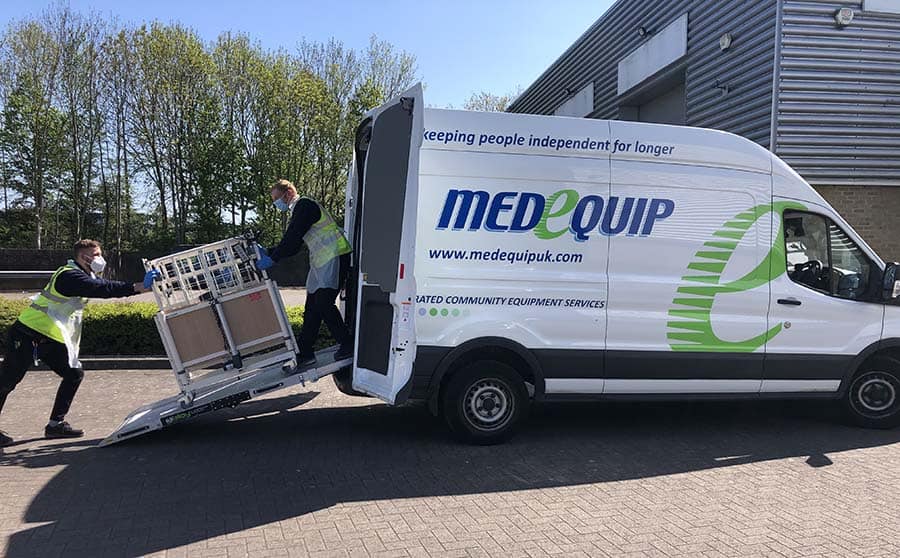Comment: Coronavirus, the supply chain and the inevitable costs for business

As well as serious implications for people’s health, the COVID-19 pandemic has significantly impacted businesses and the economy. Never has there been a more pressing need for organisations to rethink and reconfigure their businesses for a changed world.
In the case of Medequip, the pandemic led to an increase in demand for its products and it had to call on its contacts overseas in order to meet these commitments. But the problems didn’t stop there. A second wave came along and suddenly the firm was having to cope with delays in its stock from these overseas suppliers and huge increases in shipping costs.
Mike West, Procurement Director for Medequip, discusses the impact of the coronavirus pandemic on product availability, logistical challenges and the resultant commercial implications.
By Mike West
Coronavirus, the supply chain and the inevitable costs for business

The entire world is currently weathering not just a global health crisis but an economic perfect storm impacting on the cost and availability of goods. Transport capacity constraints combined with raw material shortages and lead time issues are being felt keenly in every sector of the economy.
At Medequip, we have certainly not been immune to these commercial disruptions. The first wave of coronavirus in the early months of 2020 saw a massive increase in demand for hospital beds for the acute sector, in particular to equip the new Nightingale field hospitals. As a result, our allocations of beds and dynamic mattresses from suppliers were reduced significantly.
Addressing the shortages
We mobilised to address these shortages, using our contacts to bring in beds and mattresses from overseas to match the demands of our contracts across the UK. Transferring product from our network of UK depots to balance demand has helped to ensure security of supply. In addition, our focus on returning stock to shelf via our return, recycle and reuse campaigns has played an important role in securing our position. Faced with significant issues, we succeeded in stockpiling critical equipment to meet our commitments.
Working with our partners
We were able to use our established contacts to help our partners too, during the scramble for PPE in the early stages of the pandemic. As an example, at the request of the London Consortium we sourced 200,000 FFP2 face masks from Chinese suppliers and airfreighted these into the UK for distribution across the London boroughs. This initiative helped to keep OTs and other essential practitioners safe out in the field.
Making the commercial decision to take on an additional £2M of inventory cushioned Medequip from shortages of the staples such as beds, mattresses and hoists. As a result, we have been able to keep our partners supplied despite increases in demand caused in part by accelerations in hospital discharges.
The new challenges of the second wave
We took a deep breath over the summer and early autumn, but the second wave of coronavirus has brought with it a completely new set of commercial challenges. With all of the PPE ordered by government coming into the UK in containers and enormous global demand for imported materials coming from China, in November and December containers began to pile up in ports in UK and USA.
Massive increases in shipping costs
Resultant queues in congested ports have led to a massive imbalance of containers across the globe and therefore lack of availability. Shipping lines have taken advantage of this unprecedented situation. Early in 2020, shipping costs for a typical forty foot container from Shanghai to the UK would have been around £2,000.
Now, we are paying at least six times that figure for the same shipment. This is impacting not just ourselves but the majority of UK manufacturing businesses, most of whom will use at least some components manufactured in China.
The situation is affecting lead times too. Previously, we could guarantee a five week lead time for imported goods. Now, despite shipping costs which have increased six fold, that lead time has extended to six to seven weeks, with ships operating a ‘steaming slowly’ policy and stopping at every port between Shanghai and Felixstowe.
The Brexit effect
And so to Brexit. Here, removal of the threat of tariffs achieved through the trade deal and a period of 12 months grace on regulatory and legal uncertainties mean that for Medequip, Brexit does not present such huge hurdles. The good news is that we are currently seeing only minimal disruptions in product availability from European suppliers and also minimal paperwork delays.


